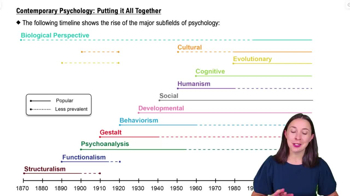Table of contents
- 1. Introduction to Psychology1h 43m
- 2. Psychology Research2h 20m
- 3. Biological Psychology2h 41m
- 4. Sensation and Perception28m
- 5. Consciousness and Sleep32m
- 6. Learning41m
- 7. Memory34m
- 8. Cognition37m
- 9. Emotion and Motivation35m
- 10. Developmental Psychology33m
- 11. Personality48m
- 12. Social Psychology41m
- 13. Stress and Health41m
- 14. Psychological Disorders44m
- 15. Treatment47m
1. Introduction to Psychology
Contemporary Psychology: Putting it All Together
Struggling with Psychology?
Join thousands of students who trust us to help them ace their exams!Watch the first videoMultiple Choice
_____ is the study of the physical changes in the brain and nervous system during thinking.
A
Behavioral psychology
B
Evolutionary psychology
C
Sociocultural psychology
D
Cognitive neuroscience
 Verified step by step guidance
Verified step by step guidance1
Identify the key term in the question, which is 'the study of the physical changes in the brain and nervous system during thinking.'
Understand that this field focuses on the biological processes and aspects that underlie cognition, with a specific emphasis on the neural connections in the brain which are involved in mental processes.
Recognize that the term 'cognitive neuroscience' is a subfield of neuroscience and psychology that studies the neural mechanisms underlying cognitive functions.
Differentiate cognitive neuroscience from other psychology fields mentioned: Behavioral psychology focuses on observable behaviors, Evolutionary psychology examines psychological traits as adaptations, and Sociocultural psychology looks at how society and culture affect behavior.
Conclude that the correct answer is 'Cognitive neuroscience' as it directly relates to the study of brain and nervous system changes during thinking.

 4:54m
4:54mWatch next
Master Contemporary Psychology with a bite sized video explanation from Hannah Gordils
Start learningRelated Videos
Related Practice




















